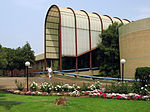Heroes' Acre, Pretoria
1867 establishments in AfricaCemeteries in South AfricaHistory of PretoriaTourist attractions in GautengTourist attractions in Pretoria ... and 1 more
Use South African English from April 2013

The Heroes' Acre (Afrikaans: Die Heldeakker; Dutch: De Heldenakker) is a section of Church Street Cemetery in Pretoria, South Africa. It was established in 1867, and contains the graves of renowned citizens and public figures. It is the burial place of a number of historical figures including Andries Pretorius, Paul Kruger and Hendrik Verwoerd. Australian Boer War war criminal Harry "Breaker" Morant (executed by the British for war crimes during the Second Anglo-Boer War) is also buried here.
Excerpt from the Wikipedia article Heroes' Acre, Pretoria (License: CC BY-SA 3.0, Authors, Images).Heroes' Acre, Pretoria
W.F. Nkomo Street, Pretoria Tshwane Ward 58
Geographical coordinates (GPS) Address Nearby Places Show on map
Geographical coordinates (GPS)
| Latitude | Longitude |
|---|---|
| N -25.7464 ° | E 28.1747 ° |
Address
W.F. Nkomo Street
W.F. Nkomo Street
0126 Pretoria, Tshwane Ward 58
Gauteng, South Africa
Open on Google Maps






